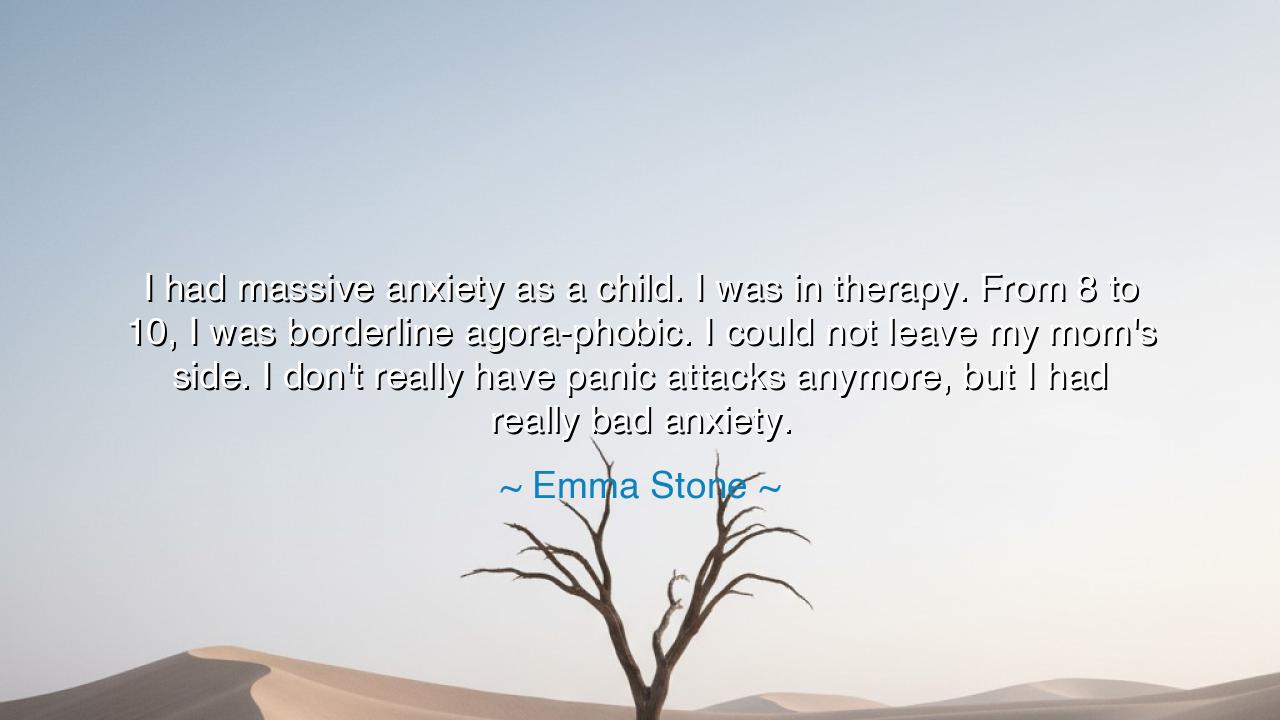
I had massive anxiety as a child. I was in therapy. From 8 to 10
I had massive anxiety as a child. I was in therapy. From 8 to 10, I was borderline agora-phobic. I could not leave my mom's side. I don't really have panic attacks anymore, but I had really bad anxiety.






In the tender and revealing words of Emma Stone, we find the confession of a soul that has wrestled with its own shadows: “I had massive anxiety as a child. I was in therapy. From 8 to 10, I was borderline agoraphobic. I could not leave my mom's side. I don't really have panic attacks anymore, but I had really bad anxiety.” Though simple in its phrasing, this quote is the voice of a warrior — one who has looked into the depths of fear and learned to live beyond it. It speaks not of weakness, but of courage; not of frailty, but of growth. For the ancients would tell us: the heart that trembles and yet endures is braver than the one that never trembles at all.
The origin of this quote lies in Stone’s reflection upon her own youth — years marked not by fame or fortune, but by struggle. Before she became an award-winning actress known for her charisma and strength, she was a child overcome by anxiety, gripped by the invisible hand of fear that many cannot name, but millions quietly endure. Her world grew small — as though the walls of safety were drawn close around her — until she could not bear to be far from her mother’s side. Yet even in that confinement, something sacred was taking root: the awareness that fear, though powerful, could be understood, faced, and ultimately transformed.
The ancients would have recognized such a journey as the trial of the soul. In Greek myth, heroes did not only face monsters outside of themselves — dragons, serpents, or storms — but also monsters within: doubt, despair, and madness. The story of Heracles, who endured both divine torment and his own rage, reminds us that strength is born not from ease, but from confrontation with the self. So too did Emma Stone, in her own time, descend into the labyrinth of her mind. Her therapy was her thread — her modern Ariadne’s guide — leading her slowly out of darkness toward the sunlight of peace. And through her words, she becomes not merely a performer on screen, but a teacher of resilience.
It is no small thing to speak of fear so openly. For in every age, many hide their pain, afraid it will make them seem fragile. But Stone’s words carry the opposite power — they shatter silence. In her honesty, she dignifies the experience of millions who battle anxiety in secret, showing that even those who seem strong and radiant have walked through nights of trembling. This act of vulnerability becomes an act of strength — proof that courage does not mean the absence of fear, but the decision to move forward despite it. As the ancient poet Virgil wrote, “They can because they think they can.” To name one’s fear, to speak it aloud, is the first act of mastery.
History gives us many who have carried similar burdens in silence. The philosopher Søren Kierkegaard, whose works gave birth to existential thought, wrote that “anxiety is the dizziness of freedom.” He himself lived in torment, struggling between faith and despair, yet from his suffering came insight — the understanding that fear can be the beginning of wisdom. Likewise, in our time, Stone’s admission teaches that vulnerability is not defeat, but awakening. To face anxiety is to begin to know the soul — its limits, its needs, its infinite capacity for healing. The one who accepts their trembling heart learns to hold it gently, and in doing so, becomes whole.
There is also profound beauty in her mention of her mother. As a child, she clung to her mother’s presence as one clings to a harbor in the storm. This bond reveals the timeless truth that love is the first medicine of the human spirit. Just as ancient healers believed that the heart heals through connection — that no soul can rise alone — Stone’s recovery began with trust. Her mother’s presence was not a sign of dependency, but a bridge toward strength. From that love, she found the courage to step beyond fear, to stand again in the open world.
And so, from these words, a lesson emerges for all who listen: fear may visit you, but it does not define you. Do not curse your anxiety or hide your trembling heart. Instead, meet it with compassion, as Stone did. Seek help, as she did. Speak, as she has spoken. The path to peace is not the denial of fear, but the understanding of it — the patient learning that what once imprisoned you can, in time, become your teacher. When the storm rises within you, remember: even those who shine brightest once walked through shadow.
Thus, let Emma Stone’s words echo through time as both confession and encouragement. The child who could not leave her mother’s side became a woman who walks confidently upon the world’s stage. Her journey is proof that the human spirit, though frail, is infinitely resilient. As the ancients taught, every soul must face its own dragons — yet the dragon’s fire can also forge the sword that will one day slay it. So, to all who live with trembling hearts: take heart. Fear is not your end; it is your beginning. Face it gently, and in time, like Stone, you too shall rise — not unscarred, but stronger, wiser, and beautifully whole.






AAdministratorAdministrator
Welcome, honored guests. Please leave a comment, we will respond soon